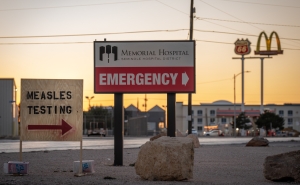Cervical Cancer is Preventable
We can stop cervical cancer by making full use of the tools we have.

Cervical cancer can be prevented by HPV vaccination, routine cervical cancer screening, and follow-up treatment—yet more than 11,000 new cervical cancer diagnoses and about 4,000 deaths occur each year in the U.S.
For Cervical Cancer Awareness Month, we spoke with cancer epidemiologist Gypsyamber D’Souza, PhD ’07, MPH, MS, about who’s most at risk for this cancer—and what we can do to further reduce its death toll.
Who is at highest risk of cervical cancer?
In the U.S., cervical cancer is a rare cancer because the majority of cancers are detected by screening when they are still pre-cancers (and treatment prevents them from becoming cancer).
Cervical cancer rates are highest among women in their 30s and 40s. Rates of cervical cancer continue to decrease in the U.S. due to successes in cervical cancer screening (cervical HPV testing and/or Pap testing).
Are there populations at risk who tend not to realize they’re at risk?
Screening is recommended up to age 65. After age 65, screening is not needed if there is a series of prior normal screening results, so most women in the U.S. will no longer need cervical screening. However, if women have not been adequately screened or have a recent history of abnormal results, the risk of cervical cancer is still present as they age. More than 20% of cervical cancer cases in the U.S. are in women over 65.
Transgender men are also at risk for cervical cancer and should be screened.
What misperceptions do people have about cervical cancer?
Cervical cancer is a 100% preventable cancer. We have two great tools—HPV vaccination and cervical cancer screening—which are both important in preventing cervical cancers. HPV vaccination is recommended for everyone age 26 or younger since it prevents new HPV infections but does not help clear HPV infections you already have. For older individuals who did not get the HPV vaccine, screening can help to detect cervical pre-cancers when they are small and treatable and prevent cancer from occuring.
For women who have had the HPV vaccine (at the recommended ages), there is still a low risk of cervical cancer since the vaccine prevents most but not all types of HPV, so some screening is still needed, though not as frequently.
What can people do to protect their cervical health?
- Get regular cervical cancer screening.
- Be proactive if screening comes back abnormal. It’s important to do follow-up testing and treatment as needed.
- Get the HPV vaccine if you’re 26 years old or younger.
- Practice safe sex.
- Stop smoking and maintain a healthy weight.
What change(s) do you think would make the biggest difference in reducing the number of deaths from cervical cancer?
We can reduce cervical cancer by helping to reduce barriers to cancer screening and treatment. Cervical cancer rates are low in the U.S. because of our great screening program, which is a big success. But any cervical cancer case and death is one too many.
Those who develop cervical cancer either:
- Had an abnormal screen but did not go for treatment because of challenges or barriers (whether time, transportation, cost, etc.).
- Were not screened. While many women are regularly screened or get screened just a little later than recommended, there are also many who rarely—or never—have cervical cancer screening. Reaching those in the targeted ages for screening who have not been screened in the past 10 years and helping them get screened can help those most at risk.
- Were underscreened. Sometimes a screening test does not catch an abnormality that is growing, which is why screening is needed every few years. With COVID challenges over the past few years, some women have skipped their screenings, and helping get women back into regular screening will prevent cancers.
Melissa Hartman is managing editor of Hopkins Bloomberg Public Health magazine and associate director of editorial at the Johns Hopkins Bloomberg School of Public Health.
Editor's note: The first paragraph of this article was updated in July 2024 to remove an inaccurate historical reference.





